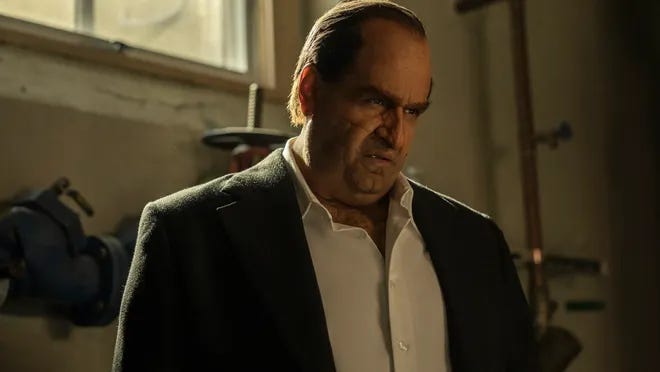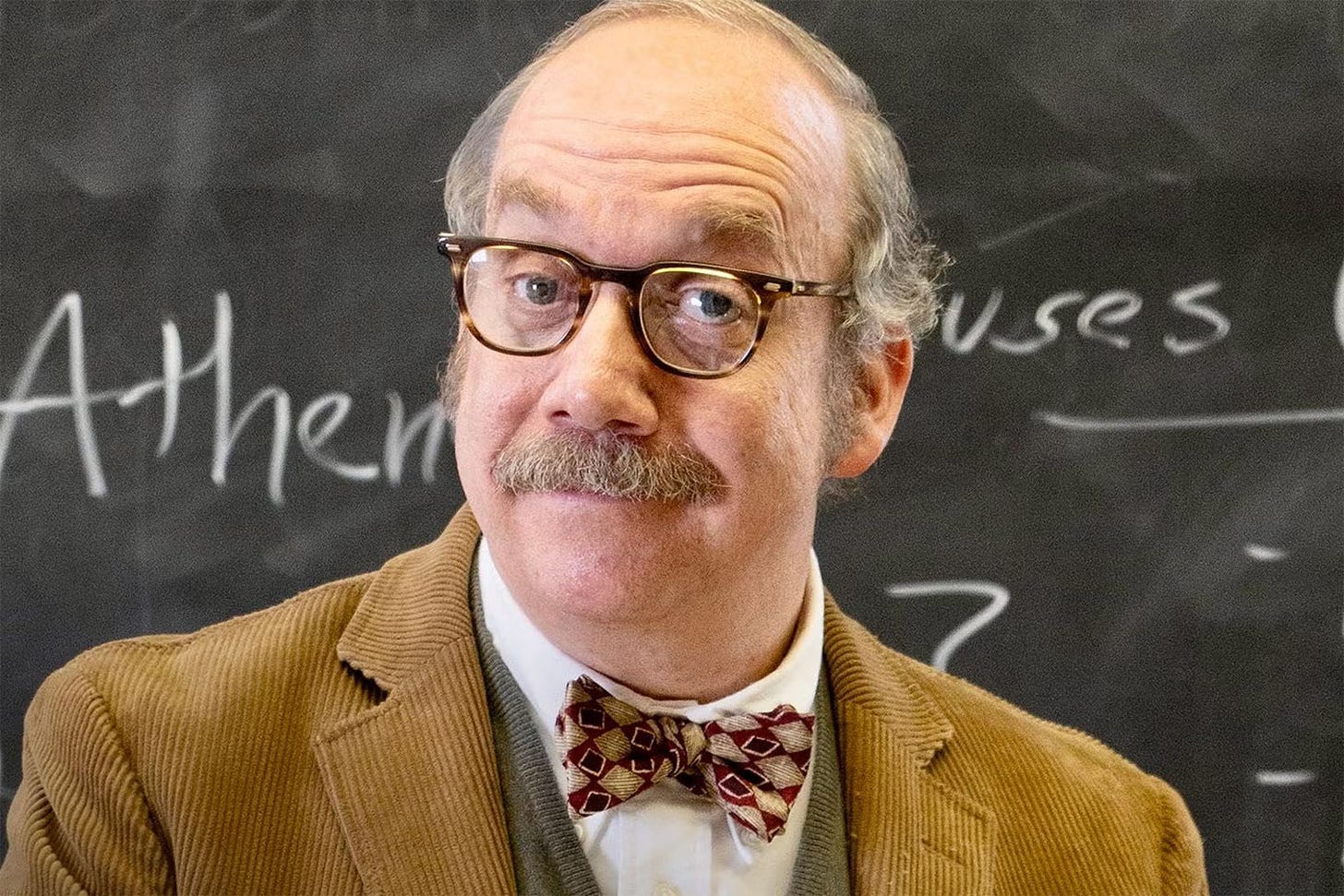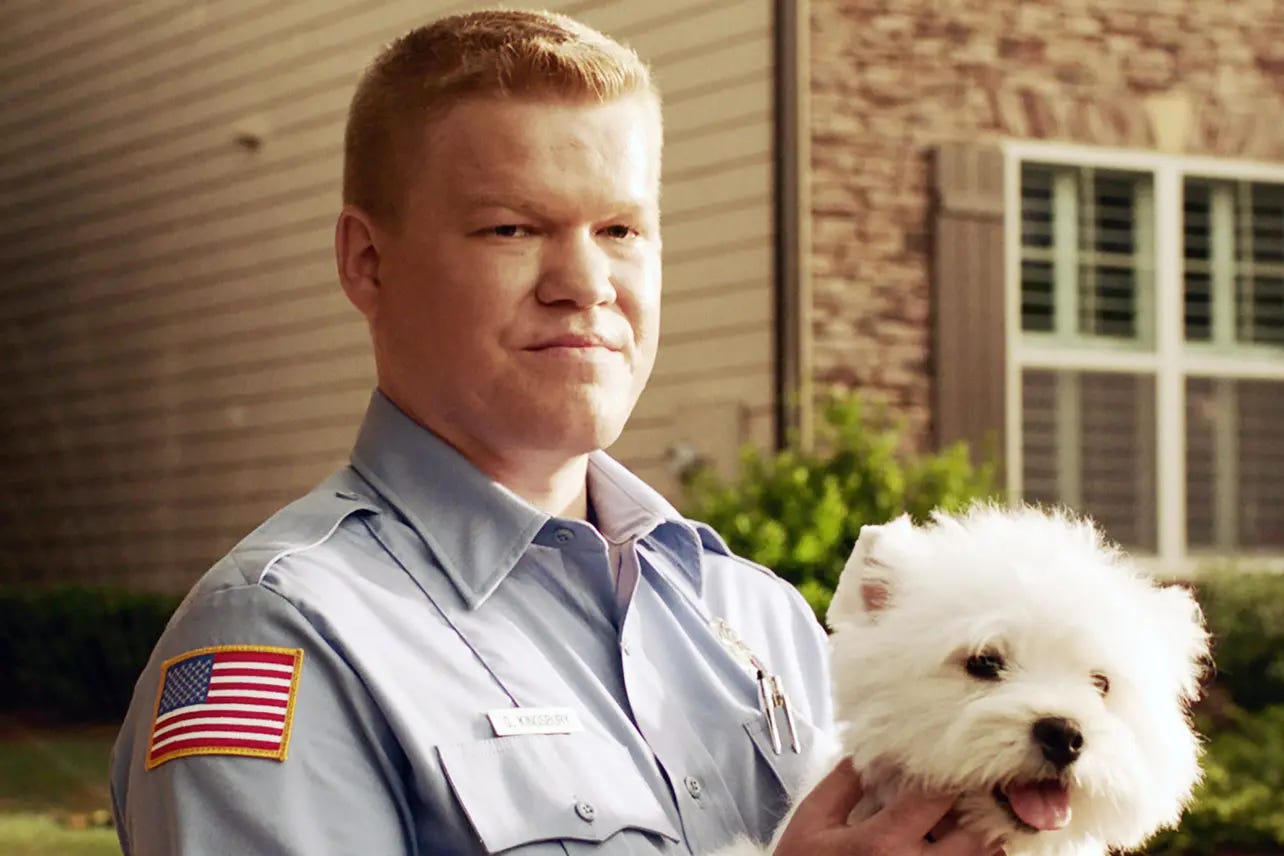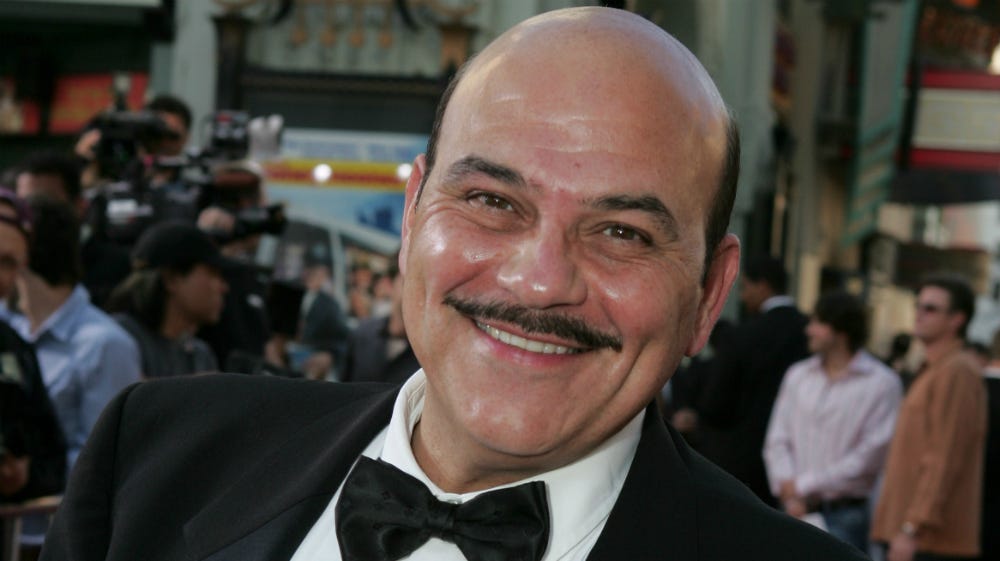Given that I don’t usually make time to engage with new TV shows while they’re on due to a combination of not having enough time and trying not to let the discourse influence my thoughts and feelings, my wife was a bit surprised that I wanted to keep going with The Penguin. I’m notoriously not a fan of comic book adaptations, and can’t help but think of the SNL sketches that parody the modern, gritty takes on old favorites by using Oscar the Grouch and Mario Kart in place of classic DC Comics characters, but I was drawn to the idea of the new show mostly because even the network isn’t hiding the fact that The Penguin is just The Sopranos for people who care about things like who’s playing Superman next or ranking the best actors to play the Joker (1. Jack, 2. Cesar Romero, 3. Mark Hamill). I like shows and movies about organized crime and was curious to see how they’d take an iconic villain and turn him into a mafia guy. It’s an interesting enough idea to me that I watched it, but right away I couldn’t pay attention because Colin Farrell in a fat suit and uglyface makeup is just too hard to take seriously. And that’s not even including the Irish actor’s tri-state mobster accent.
I know there’s a lot of talk these days about representation, about how if you have a character in a film that’s of a certain background (Black, Jewish, Native, etc.), studios should get people of those backgrounds to play them. That logic makes sense to me, even though I’m a firm believer in the Jewish x Italian Handshake. And I’m also not against makeup or prosthetics to get somebody to look less like themselves and more like the character they’re playing, so as long as we’re not talking something like Bradley Cooper’s nose in Maestro. But there really is a line when it’s too much, and Farrell’s Penguin crossed it. I’m not offended by a guy in a fat suit like some might be; I just can’t take the show seriously because Farrell’s getup is ridiculous. Surely there was somebody, anybody better for the role. I’m a big fan of Farrell’s, but at least the creators of Gotham tried something different by making their Penguin a creepy emo dandy.
While Burgess Meredith played the perfect cartoonish embodiment of the character on the 1960s Batman TV show, the greatest Penguin was played by Danny DeVito in 1992’s Batman Returns. Part of that was thanks to makeup, Tim Burton’s vision, and DeVito’s skill, but it also helped that nobody else looked like the actor who stands 4 feet 10 inches. Nobody looked like DeVito then, and there’s nobody like him now: short, stout, bald, and with an undeniable New Jersey accent he never hides to boot. As long as I can remember, DeVito has always been a great and beloved actor. He wasn’t a leading man in big blockbusters the way some of his co-stars may have been, but it’s impossible to think of a dozen iconic shows and movies he’s been in without his participation. It’s also impossible to imagine a guy who looks like him showing up to a casting call today and even getting the slightest bit of consideration. As much as you’ll hear people lament how Hollywood has “run out of ideas,” the way interesting, or even normal-looking actors have been phased out has taken much of the pleasure out of watching anything these days. The CGI and looming threat of AI writing scripts is bad enough—it would be nice if I didn’t get a Google Alert every few days that another movie star was seen entering the office of the Beverly Hills plastic surgeon I happen to share a name with.
I have a lot of friends out in L.A., most of them have ties to the movie industry in some way and give me a lot of gossip that seems both alien and vaguely familiar to me having survived so long in the NYC media and publishing bubbles. Some of it is the common X director is a maniac, X project is never going to get made, or All studios want is some new take on (insert surprise success here). Connected to that last example is the actor who has seen their stock rise, the guy who was an easy get a few years ago, but an award or acclaim changed all of that. You’re seeing it right now with Ebon Moss-Bachrach or Lamorne Morris after well-deserved Emmy wins, but the 57-year-old Paul Giamatti suddenly being a guy everybody wants to cast feels a bit off since the guy has been consistently great for years. And, let’s face it: he doesn’t have leading man good looks. That’s not an insult considering me, you, and 98 percent of the population of this planet also don’t look like whatever hot guy of the year is getting leading roles simply because his greatest talent is taking off his shirt, it’s just how Hollywood works. Hot guys who have great abs and beautiful hair are considered more bankable than a guy with some flab on his belly, bags under his eyes, and more hair in his ears than on his head. I don’t like that, but it’s the truth.
Yet in the last year since The Holdovers ended up one of the biggest Hollywood stories after the success of “Barbenheimer,” I’ve heard the same thing from three different people who were all working on other projects since before WGA and SAG-AFTRA strikes of last year: they wanted Giamatti even though whoever signs the checks said he wasn’t a bankable enough name, but now everybody wants to work with the Oscar-nominated star and they can’t get him. One friend, working on a film of their own, mentioned since Giamatti isn’t an option any longer, they’ve suggested both Steve Buscemi and John Turturro for the role, only to hear the same thing they’d previously heard about the now “how” Giamatti. There’s something so depressing about that to me, especially given that I’d consider plopping down money to see almost anything if Giamatti, Buscemi, or Turturro were in it.
I get that my 17 or 18 bucks (God, that’s so much money…) doesn’t make much of a difference to the film industry, and I know people use the term “movie star good looks” for a reason, but just casually watching even whatever we’d call “direct to video” in the streaming era, there is such a noticeably vast difference between movies from even 20 years ago and today in terms of who gets cast and who doesn’t make the cut. Most actors look…a little too perfect, which often muddles the experience. And since it’s my place to make arbitrary statements, I certainly don’t think I’m the only one who has felt that there has also been a significant dip in the quality of movies over that period as well. A lot of blame for the decline of people paying to see movies in theaters was placed on the pandemic, but I believe it started before that; besides the half-baked remakes of old movies, comic book blockbusters, and the streaming arms race to get as much made and out to the public as possible, movies becoming “content” the way so much of our media has means you have more watered-down dreck than ever. It also means the people in charge of making that watered-down dreck need to do everything in their power to make sure they make money, so thinking certain actors might be safe bets over others makes some sense, I suppose.
There are some exceptions, the most notable is Adam Driver being the guy just about every big director wants to work with. He can be a big part of the Star Wars story or he can star in Megalopolis. Granted, Driver is no schlub by any means—I’d just classify his look as “The hottest member of the Ramones you’ve never heard of.” Although I’ve passed Paul Dano a dozen times in Brooklyn and even had a conversation with him, I didn’t realize it was the actor who I’ve called a “beast” more than a few times. Tom Hardy is a very good-looking guy, but I’ve seen him play some characters that he could have easily made uglier, and his skill as an actor makes him believable in almost every role. And if I had to name one actor who always makes me go, “Oh damn, he’s in it? I’ll check it out,” it’s Jesse Plemons. With all due respect, he’s one of the most unassuming-looking guys I’ve ever seen in movies. Yet he’s elevated just about everything I’ve seen him in since Friday Night Lights. Given he was stellar in The Master and Martin Scorsese seems to like working with him, 2018’s Game Night shouldn’t be one of his films that comes immediately to mind. Yet just about everybody hears his name and the first thing they think of is the shot of him from that film where he’s in a police uniform and holding a little white dog.
I recently talked with the Guardian for an article with the headline “Male midlife makeovers steal the spotlight at Paris womenswear shows.” The piece was about fashion houses and streetwear brands chasing older guys like Daniel Craig, Lenny Kravitz, and Jeff Goldblum to wear their clothes or walk their runways. When the reporter, Chloe MacDonnell, reached out to me with her idea for the piece, I thought a lot about what it all means. What I landed on is that the idea of what we define as "classic" is shifting, especially regarding men's style. It used to be that a specific decade would be in style, like how 1990s style was very focused on the '70s, there was a big '80s boom in the 2000s, and today, the "indie sleaze" thing calls to mind looks from the 2000s. But the canon of things we consider true classics—whether it's something swanky like a black tuxedo or as casual as a pair of Converse Chuck Taylors—hasn't added much in the last few years because we're so stuck in this retro cycle. There aren't many new or emerging sartorial classics right now, but there are classic guys; Goldblum or Willem Dafoe are singular, weird, and handsome in ways that you wouldn’t call “standard.” But I can’t see room for people who look or act like them in modern entertainment; there's such a huge gulf between interesting, real-looking men and the incredibly hot, almost unreal-looking type of actors we see these days.
If he were still alive and I had my choice of who to pick for the Penguin, I’d love to give Jon Polito a shot. He’s been on my mind lately because I’ve been watching Homicide: Life on the Street, and keep thinking about how great it was that both Dick Wolf and the Coen brothers could find roles for him. Granted, not a leading man, but he’s another actor who I couldn’t see finding much footing in today’s world of hair plugs and Ozempic. After I did my fan casting of Polito as the Batman nemesis, I started thinking of other actors who I popped up in some of my favorite films and shows 20 or 30 years ago, and got all the way to Philip Seymour Hoffman. Hoffman died a decade ago, in February 2014. At that point, he was one of the most acclaimed actors of his generation, with Oscar and Golden Globe wins, as well as a Tony nomination. At the time of his death, he was part of the big-budget, big-money Hunger Games franchise, but he was still doing smaller films, John le Carré adaptations, and in 2012, he turned in one of the best performances in a Paul Thomas Anderson film as Lancaster Dodd in The Master. He had an incredible body of work and it’s hard not to think of how much more he could have done, but if he were trying to break into the industry today, I don’t think there’d be room for Hoffman. The same goes for other greats we lost too soon, James Gandolfini and Michael K. Williams. It’s hard to see them fitting into the airbrushed perfection of modern entertainment. Maybe they could get smaller roles, the sort that they started their careers with—but I can’t see executives getting excited about giving the green light to projects that focus so much attention on an overweight bald guy or an actor with a scar down his face.
You don’t have to look a certain way to be a good actor. Ryan Gosling is a perfect example of this: I think he’s the Harrison Ford for millennials. Auston Butler, who also gained early notoriety as a young actor on the Disney Channel, is an even better one: he’s so good-looking that people don’t always take him seriously as an actor. Some people mocked his intensity and commitment to method acting for Elvis, but I thought he was great in it. The same goes for last year’s The Bikeriders, in which he was tasked with playing a role that was equal parts young Marlon Brando and James Dean, and he was excellent. The problem is that you can be an incredible actor, but the studios aren’t casting you unless you look a certain way. That goes for lead roles all the way to character actors and people who don’t even have dialogue. Haaniyah Angus, for A Rabbit’s Foot, wrote earlier this year about Hollywood’s veneer problem, about how you could be watching some movie set in a dystopian future or the squalor of Victorian London and everybody has perfect teeth, and that article sums up a bigger problem: there just doesn’t seem to be room in Hollywood these days for crooked teeth, pox marks, flab bald heads, scars, or big noses, and that’s a shame. I’d like just a tiny bit of reality mixed in with my fantasy. I’d like to feel some human connection to the people I’m watching on a screen.







Homicide has basically ruined me for TV since I finished it about two years ago. If there are shows that can match that terrible soundtrack, now relevant style inspo & excellent writing, I’m all ears.
I'm still not sure why the used prosthetics on Collin Farrell when Richard Kind is right there.
This can all be made right by casting Richard as The Penguin's sad sack of a brother, The Puffin.